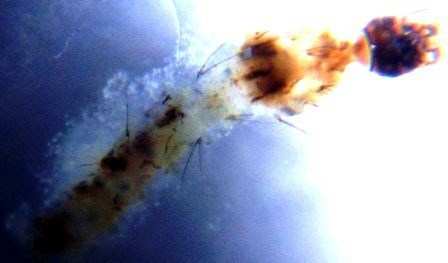MLSU Researchers discover two new strains of Bacteria to kill Mosquitoes
Researchers and Zoologists at Mohanlal Sukhadia University, Udaipur have discovered two new bacterial breed effective in controlling the mosquito population.

Researchers and Zoologists at Mohanlal Sukhadia University, Udaipur have discovered two new bacterial breed effective in controlling the mosquito population.
Bacillus Subtilis and Streptomyces indiaensis are the new bacterial strains, isolated and identified of soil bacteria which have been accessed of their toxicity against the Anopheles stephensi- the main malaria vector in South Rajasthan.
The National Centre for Biotechnological Information, (NCBI) USA has registered both the strains in their gene bank with due credits to the scientists.
The two strains of medically important groups of bacteria were isolated first time in the Insect microbial and herbal control laboratory of the Zoology department in research protocol of using soil bacteria against one of the malarial mosquito Anopheles stephensi by research scholar Priyansh Mathur, confirmed by Dr Arti Prasad, his guide and the associate professor of the department.
They were sent for strain identification to the NCBI and it was identified as strain LMG199961 with accession number KJ170314 of Streptomyces indiaensis and strain IF5 with accession number KJO22639 of Bacillus subtilis.
‘To control mosquitoes, various pesticides are being used widely, however bacterial products have been proved more successful than any other group of microbial for the control of mosquitoes at larval stage’ elaborated Priyansh.
Of the discovered strains Streptomyces indiaensis have potential of cent percent check of larval population while Bacillus subtilis was also effective and showed 70-80% mortality of the larvae.
After treatment to the mosquito larvae various developmental changes were observed that made them incapable of growing and breeding.
‘ World Health Organization, in its malaria control program is giving significant emphasis on mosquito control through bacterial interventions. Hence these two isolated bacteria along with their two strains is a significant finding in vector control strategies’ said Dr. Prasad.
Because of their easy availability from the soil, significant product for mosquito control could be developed in future.
It is a new weapon which can be added to the array of microbial agents for use against mosquitoes, she asserted.
The various products of Bti and Bs are already available in market such as Vectolac and Vectobac. The Bio-fuse product of Bti and BS “Vectomax” is fast-acting, long-lasting solution for comprehensive mosquito control and management of resistance to other active ingredients.
Bti and Bs have a direct impact on Public Health workers’ efforts to control two mosquito-borne diseases that have plagued mankind for thousands of years. This work should encourage scientists and those on the front lines of mosquito control to re-think their view of these two useful tools.
By Geetha Sunil Pillai
To join us on Facebook Click Here and Subscribe to UdaipurTimes Broadcast channels on GoogleNews | Telegram | Signal


